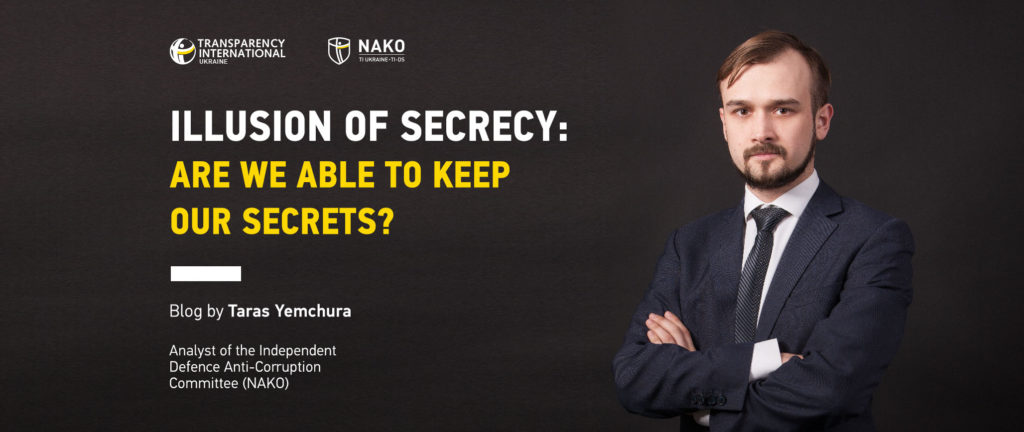In Ukraine, about 55 percent of defence procurement is classified through the State Secrets. While the best international practices range from 1 to 20 percent of secret defence spending.
Thus, Georgia has chosen the way of transparency: its Ministry of Defence has reduced the secret expenses from 90 percent to six in just three years.
Which direction should Ukraine follow in light of protecting the State Secrets, and not only in procurement, is quite an urgent question to be answered.
Ukrainian and foreign experts fiercely debate on how to find the right balance between transparency and secrecy. So what’s the problem? And are there any effective recipes to solve it?
First of all, it is worth explaining what exactly we mean by “State Secrets”. According to the Ukrainian legislation, this is certain information whose disclosure may harm Ukraine’s national security.
There is a counter-question: who exactly and how determines the degree of potential harm? Is there any modern methodology that takes into account existing challenges and threats?
For example, the costs, tactical and technical characteristics of military equipment are secret, but why should they be classified? The biggest part of this weaponry is either of Soviet design, and our neighbour enemy also has it, or these are newer samples that are successfully exported around the world.
Here the procurement of evacuation transport Bogdan-2251 is quite representative. The Independent Anti-Corruption Committee on Defense (NACO) addressed this issue in detail in the research “What the Doctor Prescribed? Corruption Risks in the System of Medical Supply in the Ministry of Defence of Ukraine”.
Despite the “completely secret” nature of this procurement, virtually all of its parts became known through the open sources: from the quantity and cost to the key information on the fuel system characteristics.
Was the information about Bogdan procurement a threat to Ukraine’s national security? No. Did the classified nature of the procurement create corruption risks? Definitely yes.
On the other hand, information potentially posing a threat to Ukraine’s national security is sometimes disclosed by the careless officials or journalists.
For example, it happens with the data on the tactical and technical characteristics of the advanced weapons, pictures and video from the defence enterprises.
This happens simultaneously with the outflow of the “technology and brain drain” valuable “brain” as well as the activity of Russian intelligence networks which were incorporated into Ukraine’s state bodies for decades.
The State Secrets issue is not limited to defence procurement. It also has a significant impact on the principles of building cybersecurity systems, mobilization readiness, personnel policies, etc.
However, it is precisely in procurement that there is a risk of ineffective use of the lion’s share of resources.
Today, the process of transformation of Ukraine’s security and defence sector is on the way. We are trying to get rid of the Soviet-style approaches and paradigms and implement those practices which have proved its effectiveness in NATO member states.
There are certain areas where we have succeeded. We have moved to the professional army based on contract principles, improved the army’s equipment and food provision, introduced the purchase of some goods for the sevice men/women through the system of public procurement.
These reforms had been announced by Ukrainian politicians for decades but failed to be implemented. The situation changed only after Russia’s military aggression, along with a significant increase in the budget of the Armed Forces (about 86 billion hryvnias in 2018 against 12.2 billion hryvnias in the peaceful 2013).
However, when it comes to the procurement of weapons and military equipment, Ukraine remains in grip of Soviet approaches that slow down the development of the defence industry and Ukraine’s army.
At the level of the strategic planning documents (Strategic Defence Bulletin, Concept of the Security and Defence Sector Development, etc.), it has been repeatedly called for the de-classification of defence procurement and the change of approaches to protecting the State Secrets in general.
These documents even mention the deadlines and the people responsible for changing these approaches. However, there is a lack of any success in this regard.
Probably, there is no progress in this area not only due to the desire of corrupt officials to maintain the old rules of the game, but also due to the lack of understanding of the essence of the necessary transformations.
Overclassification not only promotes corrupt practices, but also protects the lawbreakers. In addition, it is worth remembering that in order to protect the State Secrets, it is necessary to spend the considerable amount of taxpayers money.
In countries like Ukraine, where there is a shortage of resources, it is recommended to narrow substantially the range of information that we are going to protect.
Thus, according to experts, 90% of weapons and military equipment procured currently under the State Defence Order can be transferred to public procurement.
This will save the money that can be spent on the rest of the 10% of the nomenclature that needs much better protection than today.
However, this can only be achieved after the in-depth analysis of the possibilities for introducing changes to the current legislation.
The Independent Defence Anti-Corruption Committee has examined in depth the legal framework and developed recommendations how to properly protect the State Secrets. One can find the preliminary analysis conducted by the NAKO experts here.
We expect this document to launch professional discussion and, consequently, some positive changes. We need to get rid of the illusions inherited from theSoviet past, and finally learn to keep our secrets.
NAKO analyst Taras Yemchura for Ukrayinska Pravda
Source: https://www.pravda.com.ua/columns/2018/08/21/7189794/







